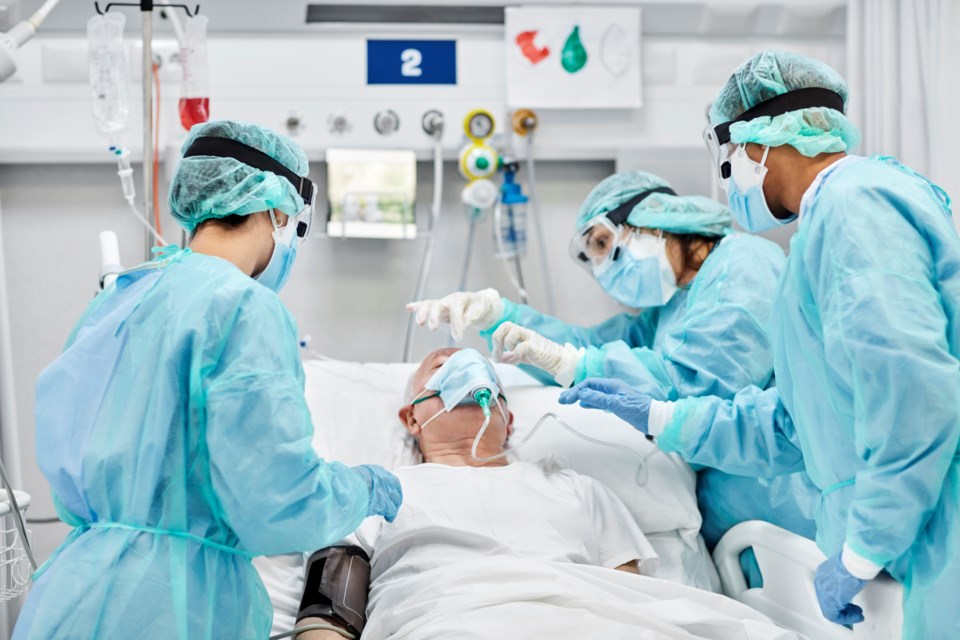People unvaccinated against COVID-19 are wreaking enough havoc in B.C.'s hospital system that the provincial government has started to move patients from the hard-hit Northern Health region to intensive care units (ICUs) in other parts of the province.
So far 12 patients have been moved, with nine of those having COVID-19. The province has allotted a total of 15 ICU beds outside Northern Health for northerners so far, with 10 of those beds being in the Lower Mainland, and the rest on Vancouver Island.
The Northern Health region has a significantly lower vaccination rate than does the province as a whole.
Health Minister Adrian Dix said on September 21 that the province's vaccination rate for those eligible to receive jabs is about 87% for one shot, and 79.4% for two shots. In the Northern Health region, in contrast, those numbers are 75% for one dose, and 65% for two doses, he said.
That disparity in vaccination rates is largely what has caused hospitals in Northern Health to reach capacity.
"Our commitment to ensure people in the North get the COVID-19 care they need has required us to make the difficult decision to transfer patients from the North to Vancouver Island, and Metro Vancouver for critical care," Dix said.
"We expect the pressure on critical care in the North will continue, until vaccination rates go up, and cases and hospitalizations go down."
Government data show that, after factoring for age, people not vaccinated against COVID-19 are 33.1 times more likely to be hospitalized than those fully vaccinated.
"This is not a question of blaming people for being sick, but we need people to understand the critical importance of vaccination," Dix said.
In addition to low vaccination rates, Dix gave statistics to show that the Northern Health region has the highest number of new and active cases per capita.
Glacier Media has for many weeks crunched numbers for the populations of each of B.C.'s five health regions to determine per-capita infections.
Province-wide, in the past 24 hours, B.C. reported 525 new cases.
By health region, Glacier Media's math shows that the number of new infections for each 10,000 residents (with total new cases in brackets) was:
• 1 in Fraser Health (187);
• 0.4 in Vancouver Coastal Health (51);
• 2 in Interior Health (147);
• 2.6 in Northern Health (79); and
• 0.7 in Island Health (61).
The result by health region for the 5,282 people fighting active infections for each 10,000 residents (with total new cases in brackets) was:
• 9.5 in Fraser Health (1,711);
• 6.6 in Vancouver Coastal Health (822);
• 15.7 in Interior Health (1,167);
• 30.7 in Northern Health (921); and
• 7.3 in Island Health (619).
The active case counts include 42 people who normally live outside B.C.
Considerable resources at B.C. hospitals are being spent treating 332 COVID-19 patients, with 155 of those individuals sick enough to be in ICUs.
There have not been this many COVID-19 patients in B.C. hospitals since May 19. ICU occupancy by those patients fell by one in the past day.
Perhaps that is because one more person has died overnight from COVID-19, raising the province's pandemic death toll to 1,900. The province did not confirm whether the death was indeed someone who had been in ICU, but the person was based in the Vancouver Coastal Health region.
More than 95.8%, or 172,624 of the 180,178 people infected with COVID-19 in B.C., are deemed by the province to have recovered because they have gone 10 days after first feeling symptoms, and are therefore not thought to be infectious.
New vaccinations continue to push the proportion of British Columbians who are vaccinated to ever-higher levels.
Health officials provided 14,225 doses of vaccine to British Columbians in the past day, with 7,607 of those being to unvaccinated individuals, and 6,618 going to those needing second doses. No data was available for any third doses, which have started to be administered to those who are considered extremely vulnerable, and immunocompromised.
Of the 4,031,909 B.C. residents who have received one dose of vaccine, more than 91.4%, or 3,685,799, are fully vaccinated, with two doses.
The B.C. government estimated in July that the province's total population is 5,147,712, so Glacier Media's calculation is that more than 78.3% of B.C.'s total population has had at least one dose of vaccine, and 71.6% of the province's total population has had two doses.
Older people are known to have more serious outcomes after becoming infected with COVID-19, which is why it is worrying that B.C. has one new outbreak at a seniors' home, at Victoria Chinatown Care Centre in Victoria. The province now has 22 active outbreaks at seniors' homes or other health-care facilities.
Other data released September 21 backs up Dix's assertions that the small number of unvaccinated people in B.C. are causing the vast majority of infections and serious cases.
For example, of the 353 hospitalizations in the two weeks ended September 19, there were:
• 279 not vaccinated (79%);
• 20 partially vaccinated (5.7%); and
• 54 fully vaccinated (15.3%).
The 4,367 cases in the week ended September 19 included:
• 2,982 (68.3%) unvaccinated;
• 340 (7.8%) partially vaccinated; and
• 1,045 (23.9%) fully vaccinated.
For every 100,000 people in B.C. who are unvaccinated, government data show that 290.3 were infected with COVID-19 between September 13 and 19. For every 100,000 people in B.C. who have had one shot of vaccine, there were 87.2 new cases, and for every 100,000 fully vaccinated British Columbians, there were only 26.3 new cases.



